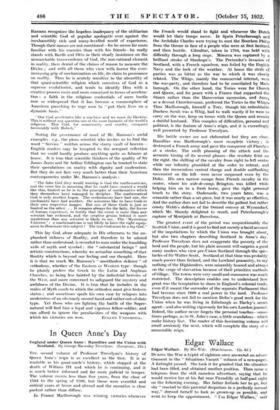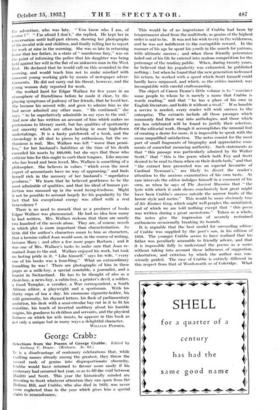Edgar Wallace •
DURING the War & typist of eighteen once. answered an adver- tisement in the " Situations Vacant " column of a newspaper. A fortnight passed. She took it for granted that the situation had been filled, and obtained another position. Then came a telegram from the still nameless advertiser, saying that he would receive her at his flat near Piccadilly at half-past eight on the following evening. Her father forbade her to go, but she " reacted to this parental despotism in a perfectly normal way," dressed herself to look as grown-up as possible,.and went to keep the appointment. I'm Edgar Wallace," said the advertiser, who was late. " You .know who I am, of course ? " " I'm afraid I don't," she replied. He kept her in
conversation until half-past eleven, showing her photographs of his invalid wife and children, and finally telling her to report for work at nine in the morning. She was so late in returning home that her father, in a-state of " murderous fury," was on the point of informing the police that his daughter was being held against her will in the flat of an unknown man in the West End. He declared that he would call on this scoundrel in the morning, and would teach him not to make mischief with innocent young- working girls by means of newspaper adver- tisements. He did not carry out his threat, however, and the young woman duly reported for work.
She worked hard for Edgar Wallace for five years in an atmosphere of friendliness before he made it clear, by dis- playing symptoms of jealousy of her friends, that he loved her. She became his second wife, and grew to admire him as she bad never admired any other man. " He- continued," she says, " to be superlatively admirable in my eyes to the end." And now she has written an account of him which makes no pretensions to literary merit, but has qualities of spontaneity and sincerity which are often lacking in more high-flown undertakings. , It is a hasty patchwork of a book, and the chronology is all shot to pieces by enthusiasm, but the en- thusiasm is real. Mrs. Wallace was left " worse than penni- less," for her husband's liabilities at the time of his death exceeded his assets by £60,000, but she says that those who criticize him for this ought to curb their tongues. Like anyone who has loved and been loved, Mrs. Wallace is something of a philosopher. She believes in values " which even the most expert of accountants have no way of appraising," and finds herself rich in the memory of her husband's " superlative goodness." We learn that he believed gentleness to be the most admirable of qualities, and that his ideal of human per- fection was summed up in the word loving-kindness. Might it not be possible to account largely for his popularity by the fact that his exceptional energy was allied with a real benevolence ?
There is no need to remark that as a producer of books Edgar Wallace was phenomenal. He had no idea how many he had written. Mrs. Wallace reckons that there are nearly two hundred of the novels alone. They are, of course, novels in which plot is more important than characterization. So little did the author's characters mean to him as characters, that a heroine called Joan would soon, in the course of writing, become Mary ; and after a few more pages Barbara ; and it was one of Mrs. Wallace's tasks to make sure that Joan re- mained Joan to the end. Wallace enjoyed his work, but took no lasting pride in it. " Like himself," says his wife, " every one of his books was a foundling." What an extraordinary foundling he was ! There are photographs of him in these pages as a milk-boy, a special constable, a journalist, and a tourist in Switzerland. He has to be thought of also as a choir-boy, a news-boy, a cabin-boy, a printer's devil, a soldier, a Good Templar, a versifier, a War correspondent, a South African editor, a playwright and a sportsman. With his thirty cups of tea a day, his enormous cigarette-holder, his wild generosity, his rhymed letters, his flash of parliamentary ambition, his desk with a semi-circular bay cut in it to fit his waistline, his touch of inverted snobbery about his humble Origins-, his goodness to children and servants, and the physical laziness on which his wife insists, he appears in this book as not only a unique but in many ways a delightful character.
WILLIAM Pio ME It .



























































 Previous page
Previous page